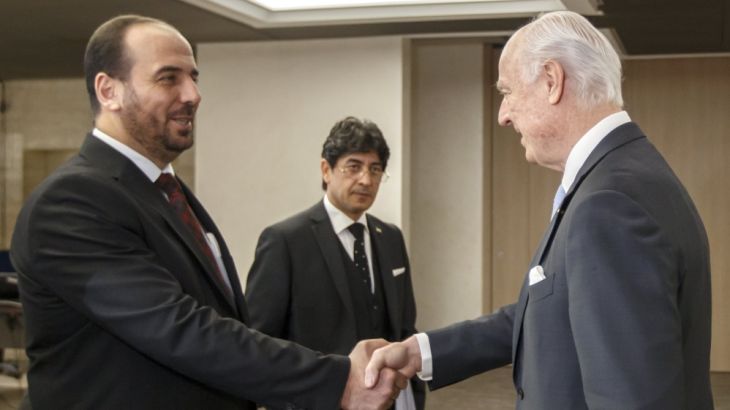De Mistura: Syria talks in Geneva end with clear agenda
Warring sides agree to more negotiations as week of unsteady talks, threatened by a crumbling ceasefire, comes to close.

Geneva, Switzerland – Syria’s warring sides have agreed to future negotiations at the end of a fourth set of talks in Geneva, a mild breakthrough after a week of stalled discussions and a steadily failing ceasefire.
Staffan de Mistura, the UN envoy for Syria, announced on Friday the conclusion of the intra-Syrian talks in the Swiss city having secured a finalised agenda for another round.
Keep reading
list of 4 itemsOstracising Israel at the UN should be a priority
UN watchdog warns on nuclear trafficking
South Africa seeks third intervention against Israel at ICJ
He said he would invite the government and opposition negotiators to Geneva for a fifth set of discussions later in March.
“We have a clear agenda in front of us,” de Mistura told reporters. “The train is ready, it is in the station … it is warming up its engine … it just needs an accelerator and the accelerator is in the hands of those in this round.”
De Mistura held back-to-back meetings on Friday, first meeting with two minor opposition groups – the Moscow and Cairo platforms – and later speaking with the Syrian government delegation and the High Negotiations Committee (HNC), the central opposition umbrella group.
“It is now clear to everyone [that] we are here to implement Security Council resolution 2254, and that is beyond dispute,” de Mistura said.
Resolution 2254, adopted by the council in 2015, lays the foundations for a political transition – the opposition’s central goal – based on three subjects, or “baskets”: accountable governance, a new constitution and UN-supervised elections within 18 months.
But before signing on to continue negotiations, government representatives demanded that a fourth subject focused entirely on “anti-terrorism” was added to the agenda.
The opposition has previously been hesitant to add “terrorism” to the agenda over fears that the government would use it to sideline discussions on political transition.
READ MORE: Syria’s Civil War Explained
“The agenda is reflected by the baskets,” said de Mistura. “Four baskets – three plus one.”
The additional subject, said de Mistura, “addresses within the context of the overall transitional political process, issues related to strategies of counterterrorism, security governance and also medium-term confidence building measures”.
The first three subjects were given an implementation target date of six months, while the fourth was linked with separate Russian-led talks in Kazakhstan’s Astana, expected to take place on March 14.
Those talks, backed also by Turkey and Iran, would be in addition to the Geneva process and deal with the “maintenance of the ceasefire, immediate confidence-building measures and operational counterterrorism issues”, de Mistura said.
Future agenda
The government and opposition are now tasked with pursuing a “framework agreement” that outlines a political transition process envisaged within the 2015 UN resolution.
The fourth Geneva talks were part of the latest political initiative to bring an end to a six-year war that has killed nearly 500,000 people, wounded more than a million, and displaced nearly half the population.
The previous round of discussions in Geneva in April was suspended after a previous ceasefire collapsed and heavy fighting resumed.
READ MORE: Syria opposition calls for Russian backing in Geneva
While the opposition has pointed to signs of progress during this week’s talks, and praised de Mistura for seeming more engaged in political transition than before, violence in Syria threatened to derail the discussions.
Government representatives, meanwhile, accused the opposition of taking the talks “hostage”, alleging that some members of its delegation belonged to “armed terrorist groups”.
Ceasefire
De Mistura said consolidation and maintenance of the ceasefire were vital to the Geneva process, while talks in Astana would be reinforcing.
“We are very much complementary. If Astana succeeds, it means ceasefire,” he said. “If a ceasefire takes place, we can have productive talks. If we don’t have productive talks, a ceasefire can’t last.”
A successful truce, he said, would also “facilitate” nationwide humanitarian access and a prisoner exchange – another key opposition demand.
The UN envoy said the government delegation had put forward an “interesting suggestion [on] the concrete possibility of exchanges of detainees and abducted people … and the obvious place for doing that is Astana”.
The issue of “detainees, abductees and missing people was raised and would continue to be raised”, he said, referring to a meeting one week ago he had with five Syrian women – mothers, daughters and wives of prisoners, many of whom were former prisoners themselves.
Follow Dylan Collins on Twitter: @collinsdyl